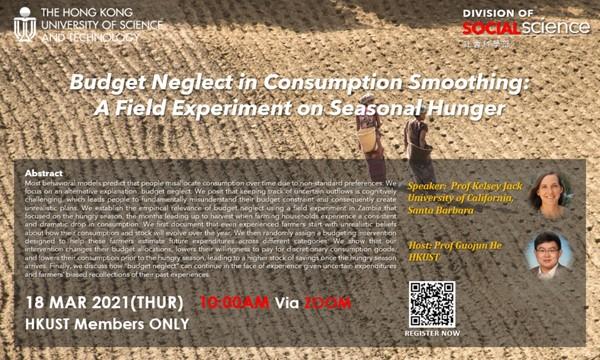Speaker
Prof Kelsey Jack
Associate Professor, University of California’s Bren School of Environmental Science and Management and Economics Department
University of California, Santa Barbara
Abstract
Most behavioral models predict that people misallocate consumption over time due to non-standard preferences. We focus on an alternative explanation: budget neglect. We posit that keeping track of uncertain outflows is cognitively challenging, which leads people to fundamentally misunderstand their budget constraint and consequently create unrealistic plans. We establish the empirical relevance of budget neglect using a field experiment in Zambia that focused on the hungry season, the months leading up to harvest when farming households experience a consistent and dramatic drop in consumption. We first document that even experienced farmers start with unrealistic beliefs about how their consumption and stock will evolve over the year. We then randomly assign a budgeting intervention designed to help these farmers estimate future expenditures across different categories. We show that our intervention changes their budget allocations, lowers their willingness to pay for discretionary consumption goods, and lowers their consumption prior to the hungry season, leading to a higher stock of savings once the hungry season arrives. Finally, we discuss how “budget neglect” can continue in the face of experience given uncertain expenditures and farmers’ biased recollections of their past experiences.
Bio
Kelsey Jack is an Associate Professor at the University of California’s Bren School of Environmental Science and Management and Economics Department. She does research at the intersection of environmental and development economics, with a focus on how individuals, households, and communities decide to use natural resources, including land, water and energy. Much of her research uses field experiments to test theory and new policy innovations. She has conducted research in numerous countries in Africa, Asia and Latin America, and has ongoing work in South Africa, India, Zambia and Niger. She joined the faculty at UCSB after seven years as an Assistant Professor in the Economics Department at Tufts University. She co-directs the Energy Environment and Climate Change Sector at J-PAL, where she also serves on the Executive Committee. She holds a bachelors degree in Public and International Affairs from Princeton University and a PhD in Public Policy from Harvard University. Before graduate school, she spent two years in Lao PDR working for IUCN.

